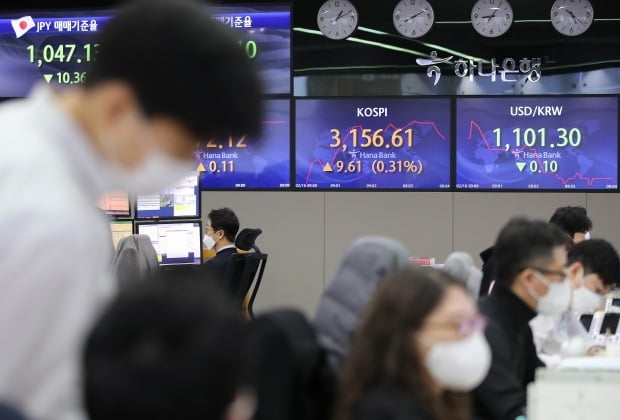
Photo = Yonhap News
The balance of dollar deposits held by companies and individuals decreased by about 4 billion dollars (about 4,416 billion won) last month. It is the largest decrease in 11 months on a monthly basis. As the won-dollar exchange rate soared (dollar value increased), there was an increased movement to see the exchange rate gain by selling the dollar, which had a relatively high value.
According to the’Trends of Foreign Currency Deposits for Residents in January 2021′ announced by the Bank of Korea on the 18th, the dollar deposits for residents at the end of last January amounted to $76.16 billion (approximately 84 trillion won), down by $3.88 billion from the previous year. The decline in resident dollar deposits last month was the largest since February of last year ($6.31 billion). Resident dollar deposits are dollar deposits entrusted to banks by Koreans and foreigners who have lived in Korea for more than 6 months.
The dollar deposit remained at $6.45 billion at the end of January last year. As the preference for safe assets increased due to the Corona 19 outbreak, it showed an increasing trend, and at the end of December last year, it reached $84 billion, exceeding $80 billion for the first time in history. But last month, it went down to the $70 billion level again. In detail, the dollar deposits held by companies and individuals decreased by $3.83 billion and $50 million, respectively, to $58.43 billion and $1.73 billion, respectively.
The decline in dollar deposits last month was largely due to the fact that households and corporations sold dollars aimed at foreign exchange gains. At the end of last month, the exchange rate was 1118 won and 80 won, up 32 dollars and 50 dollars from the end of the previous month (1086 won and 30 before). That means that the dollar’s value was strong.
Foreign currency deposits, including dollar deposits, euro, yen, and yuan deposits, were totaled to $89.38 billion, a decrease of $4.82 billion from the previous year. Yen deposits decreased by $190 million to $5.25 billion, and euro deposits decreased by $350 million to $4.360 million. RMB deposits decreased by $180 million to $1.8 billion.
Some analysts say that the strength of the dollar may continue for a while, leading to a tendency to sell the dollar. This is because interest rates on US Treasury bonds are soaring due to the recent signs of US inflation. Interest rates are also soaring in anticipation that inflation could lead the US central bank (Fed) to tighten monetary policy. On the 13th, the 10-year Treasury bond yield rose 0.1 percentage points from the previous trading day to 1.3% per year, the highest in one year since February 27 last year (1.3% per year).
When the US Treasury rate rises, the number of investors seeking interest income and buying US Treasury bonds increases. The value of the dollar jumps in the process of buying government bonds by converting foreign currencies into dollars. The day before, the exchange rate increased by 7 won and 40 before the transaction ended before 1107 won and 50. This day, as of 10:28 am, it is trading 1103 won 80 before 3 won 70.
Reporter Kim Ik-hwan [email protected]
Ⓒ Hankyung.com prohibits unauthorized reproduction and redistribution
